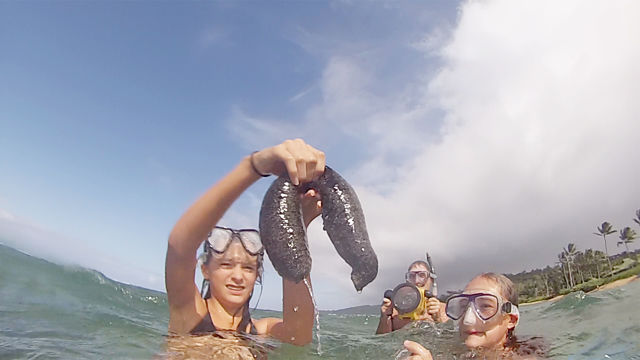HONOLULU — Following on the heels of a 120-day emergency rule which had temporarily banned all harvesting of sea cucumbers in Hawaii, Gov. David Ige has signed a measure which severely limits collection of sea cucumbers.
“The DLNR worked quickly to stop the mass harvesting of sea cucumbers, and then to develop and propose permanent rules,” Ige said in a news release. “This action is expected to protect and sustain critically important sea cucumber populations in our near-shore waters.”
The permanent rule bans any large-scale commercial harvesting of sea cucumbers. It will take effect Jan. 10.
Harvesting spiked earlier this year when collectors virtually cleared some near-shore waters on Maui and Oahu of the creatures which are considered the “vacuum cleaners of the ocean.”
“Under the law, now in effect, licensed aquarium collectors are allowed to harvest two species of sea cucumbers from Oahu waters only, with a 20-per-day maximum and an annual take of no more than 3,600 for the entire commercial fishery,” DLNR Chair Suzanne Case said in the release. “These numbers are based on data collected over many years and is expected to be sustainable.”
“The rules allow a small level of take for personal, non-commercial use,” Case added. “We will continue to monitor the sea cucumber population over the next few years to determine whether we’ve correctly set the harvest at sustainable levels, and if not whether we need to make adjustments in the future.”
Sea cucumber populations across the Pacific and elsewhere have been decimated by large-scale commercial harvesting.
These rules were approved by the State Board of Land and Natural Resources (BLNR) on Dec. 11, after a series of statewide hearings. Prior to the implementation of the 120-day emergency rule, Hawaii did not have any regulations regarding sea cucumber harvesting.
This year was the first time that mass harvesting happened in Hawaiian waters, and once the state became aware of the issue, it acted swiftly to investigate and to get permanent rules into place.
“I’m very proud of the work DAR (Division of Aquatic Resources) and the Division of Conservation and Resources Enforcement (DOCARE) did to address this issue so quickly,” said Dr. Bruce Anderson, DAR administrator. “Without this prompt action the short-lived, mass harvest of sea cucumbers could have been an ecological disaster for the sea cucumber and its role in the health of Hawaii’s coral reefs.”


